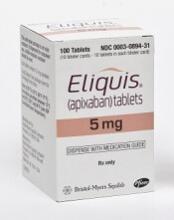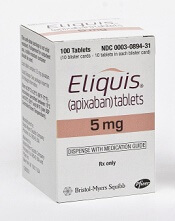User login
An analysis of data from the ARISTOTLE trial suggests patients with atrial fibrillation (AFib) have a higher risk of intracranial hemorrhage (ICH) when they receive warfarin as opposed to apixaban.
The analysis also indicates that concomitant aspirin use increases the risk of ICH among AFib patients taking either warfarin or apixaban as stroke prophylaxis.
“We know that aspirin has only a modest effect in preventing stroke in atrial fibrillation patients, yet it was one of the top predictors of intracranial hemorrhage,” said study author Renato D. Lopes, MD, PhD, of Duke Clinical Research Institute in Durham, North Carolina.
“Our finding demonstrates that aspirin is not as safe as one might think.”
Dr Lopes and his colleagues reported this finding in Blood.
Previous results from the ARISTOTLE trial, published in 2011, suggested that apixaban was superior to warfarin in terms of preventing stroke and systemic embolism, reducing bleeding, and reducing mortality in AFib patients.
However, a report published in 2013 suggested the results of this trial may have been affected by patients at 1 or more clinical trial sites receiving the wrong medication or dose, adverse events going unreported, and records being changed.
Bristol-Myers Squibb and Pfizer (funders of ARISTOTLE) said these issues likely had a negligible effect on the trial results. And the US Food and Drug Administration agreed when it approved apixaban for use in AFib patients in 2013.
Current analysis
For the current analysis, researchers used ARISTOTLE data to investigate the frequency and characteristics of ICH. They analyzed data from 18,140 AFib patients treated with warfarin or apixaban at sites in North America, Latin America, Europe, and Asia.
In all, 174 patients developed ICH. Most of these bleeds were spontaneous (71.2%) rather than traumatic (28.8%).
Apixaban vs warfarin
Patients randomized to receive apixaban had a lower incidence of ICH than those randomized to warfarin—0.33% per year and 0.80% per year, respectively.
The risk of ICH was significantly lower in the apixaban arm than the warfarin arm (hazard ratio [HR]=0.42, 95% CI 0.30–0.58; P<0.0001). The same was true for spontaneous ICH (HR=0.52, 95% CI 190 0.35–0.75; P=0.0006) and traumatic ICH (HR=0.26, 95% CI 0.13–0.53; P=0.0002).
In the warfarin arm, the median time from the most recent international normalized ratio (INR) test to ICH was 13 days (range, 6-21).
Most patients (78.5%) in the warfarin arm who developed ICH had a pre-ICH INR below 3.0. The median INR was 2.6 (range, 2.1-3.0).
Other risk factors
The researchers found that several factors other than study treatment were associated with an increased risk of ICH.
Patients treated at trial sites in Asia (HR=3.19) or Latin America (HR=1.57) had an increased risk of ICH compared to patients treated in Europe.
Each 5-year increase in patient age was associated with an increased risk of ICH (HR=1.25.)
Patients with a prior stroke or transient ischemic attack (HR=1.83) had an increased risk of ICH, as did patients receiving aspirin at baseline (HR=1.37).
The researchers said the increased risk of ICH associated with aspirin use was particularly pronounced in older patients. ![]()
An analysis of data from the ARISTOTLE trial suggests patients with atrial fibrillation (AFib) have a higher risk of intracranial hemorrhage (ICH) when they receive warfarin as opposed to apixaban.
The analysis also indicates that concomitant aspirin use increases the risk of ICH among AFib patients taking either warfarin or apixaban as stroke prophylaxis.
“We know that aspirin has only a modest effect in preventing stroke in atrial fibrillation patients, yet it was one of the top predictors of intracranial hemorrhage,” said study author Renato D. Lopes, MD, PhD, of Duke Clinical Research Institute in Durham, North Carolina.
“Our finding demonstrates that aspirin is not as safe as one might think.”
Dr Lopes and his colleagues reported this finding in Blood.
Previous results from the ARISTOTLE trial, published in 2011, suggested that apixaban was superior to warfarin in terms of preventing stroke and systemic embolism, reducing bleeding, and reducing mortality in AFib patients.
However, a report published in 2013 suggested the results of this trial may have been affected by patients at 1 or more clinical trial sites receiving the wrong medication or dose, adverse events going unreported, and records being changed.
Bristol-Myers Squibb and Pfizer (funders of ARISTOTLE) said these issues likely had a negligible effect on the trial results. And the US Food and Drug Administration agreed when it approved apixaban for use in AFib patients in 2013.
Current analysis
For the current analysis, researchers used ARISTOTLE data to investigate the frequency and characteristics of ICH. They analyzed data from 18,140 AFib patients treated with warfarin or apixaban at sites in North America, Latin America, Europe, and Asia.
In all, 174 patients developed ICH. Most of these bleeds were spontaneous (71.2%) rather than traumatic (28.8%).
Apixaban vs warfarin
Patients randomized to receive apixaban had a lower incidence of ICH than those randomized to warfarin—0.33% per year and 0.80% per year, respectively.
The risk of ICH was significantly lower in the apixaban arm than the warfarin arm (hazard ratio [HR]=0.42, 95% CI 0.30–0.58; P<0.0001). The same was true for spontaneous ICH (HR=0.52, 95% CI 190 0.35–0.75; P=0.0006) and traumatic ICH (HR=0.26, 95% CI 0.13–0.53; P=0.0002).
In the warfarin arm, the median time from the most recent international normalized ratio (INR) test to ICH was 13 days (range, 6-21).
Most patients (78.5%) in the warfarin arm who developed ICH had a pre-ICH INR below 3.0. The median INR was 2.6 (range, 2.1-3.0).
Other risk factors
The researchers found that several factors other than study treatment were associated with an increased risk of ICH.
Patients treated at trial sites in Asia (HR=3.19) or Latin America (HR=1.57) had an increased risk of ICH compared to patients treated in Europe.
Each 5-year increase in patient age was associated with an increased risk of ICH (HR=1.25.)
Patients with a prior stroke or transient ischemic attack (HR=1.83) had an increased risk of ICH, as did patients receiving aspirin at baseline (HR=1.37).
The researchers said the increased risk of ICH associated with aspirin use was particularly pronounced in older patients. ![]()
An analysis of data from the ARISTOTLE trial suggests patients with atrial fibrillation (AFib) have a higher risk of intracranial hemorrhage (ICH) when they receive warfarin as opposed to apixaban.
The analysis also indicates that concomitant aspirin use increases the risk of ICH among AFib patients taking either warfarin or apixaban as stroke prophylaxis.
“We know that aspirin has only a modest effect in preventing stroke in atrial fibrillation patients, yet it was one of the top predictors of intracranial hemorrhage,” said study author Renato D. Lopes, MD, PhD, of Duke Clinical Research Institute in Durham, North Carolina.
“Our finding demonstrates that aspirin is not as safe as one might think.”
Dr Lopes and his colleagues reported this finding in Blood.
Previous results from the ARISTOTLE trial, published in 2011, suggested that apixaban was superior to warfarin in terms of preventing stroke and systemic embolism, reducing bleeding, and reducing mortality in AFib patients.
However, a report published in 2013 suggested the results of this trial may have been affected by patients at 1 or more clinical trial sites receiving the wrong medication or dose, adverse events going unreported, and records being changed.
Bristol-Myers Squibb and Pfizer (funders of ARISTOTLE) said these issues likely had a negligible effect on the trial results. And the US Food and Drug Administration agreed when it approved apixaban for use in AFib patients in 2013.
Current analysis
For the current analysis, researchers used ARISTOTLE data to investigate the frequency and characteristics of ICH. They analyzed data from 18,140 AFib patients treated with warfarin or apixaban at sites in North America, Latin America, Europe, and Asia.
In all, 174 patients developed ICH. Most of these bleeds were spontaneous (71.2%) rather than traumatic (28.8%).
Apixaban vs warfarin
Patients randomized to receive apixaban had a lower incidence of ICH than those randomized to warfarin—0.33% per year and 0.80% per year, respectively.
The risk of ICH was significantly lower in the apixaban arm than the warfarin arm (hazard ratio [HR]=0.42, 95% CI 0.30–0.58; P<0.0001). The same was true for spontaneous ICH (HR=0.52, 95% CI 190 0.35–0.75; P=0.0006) and traumatic ICH (HR=0.26, 95% CI 0.13–0.53; P=0.0002).
In the warfarin arm, the median time from the most recent international normalized ratio (INR) test to ICH was 13 days (range, 6-21).
Most patients (78.5%) in the warfarin arm who developed ICH had a pre-ICH INR below 3.0. The median INR was 2.6 (range, 2.1-3.0).
Other risk factors
The researchers found that several factors other than study treatment were associated with an increased risk of ICH.
Patients treated at trial sites in Asia (HR=3.19) or Latin America (HR=1.57) had an increased risk of ICH compared to patients treated in Europe.
Each 5-year increase in patient age was associated with an increased risk of ICH (HR=1.25.)
Patients with a prior stroke or transient ischemic attack (HR=1.83) had an increased risk of ICH, as did patients receiving aspirin at baseline (HR=1.37).
The researchers said the increased risk of ICH associated with aspirin use was particularly pronounced in older patients. ![]()

